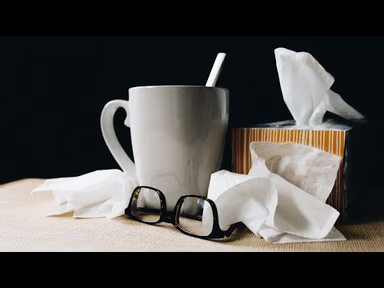
How to avoid catching a cold on public transport
Peer reviewed by Dr Sarah Jarvis MBE, FRCGPLast updated by Danny ChadburnLast updated 21 Sept 2017
Meets Patient’s editorial guidelines
- DownloadDownload
- Share
- Language
- Discussion
As any commuter will tell you, the threat of catching a cold is everywhere – from your sniffling co-passenger to that handrail everyone’s been touching.
In this article:
It’s not just paranoia; one study by the University of Nottingham in 2011 found those who use public buses or trams were up to six times more likely to catch the common cold.
In fact, up to 15% of the population will be struck down with a cold virus during the winter months, according to data from the World Health Organization. ‘This is a key time for the onward transmission of colds, as people are closer together for longer periods of time,’ says Dr Gary McLean, an honorary research fellow in the Airway Disease Infection Section of the National Heart and Lung Institute at Imperial College London.
Here are some top tips to help you avoid picking up a cough or cold on public transport this winter.
Continue reading below
What if I’m squashed next to a sniffer?
One of the main ways of catching a cold is through inhaling airborne droplets or mucus from an infected person – research by a cold and flu specialist found that just one sneeze could infect up to 150 commuters within five minutes.
As sneezes and coughs can travel a large distance very quickly, standing sideways to them is safer than standing directly opposite. If they do sneeze or cough, try not to breathe in for a few seconds.
Should I avoid touching anything?
Surfaces like handles, buttons and handrails are key places for cold viruses to linger, but whether you pick them up depends on the length of time the virus has been on the surface, the amount of virus deposited by an infected person and, if you then transfer the bugs by touching your eyes and nose, the ‘optimal portal’ for entry.
If you see a sick person touching certain surfaces, avoid contact with the same ones but if you have to, definitely don’t touch your nose or eyes afterwards.
There is no particular ‘hotspot’ for colds and other viruses on public transport; it can be any place where people’s hands leave behind a reasonable amount of virus that will then be touched by another person. Be aware of escalator handrails, ticket machines, maps, etc too, not just the handrails on the bus or Tube.
Continue reading below
Do I need a face mask?
Australian researchers discovered that wearing a face mask at home could help protect you from picking up the flu virus if someone else is ill, but experts agree they’re not effective on public transport.
This is because you may not be wearing the mask properly – so germs can still get in – and you can easily pick up a virus if you touch something and then rub your eyes. Plus, if you take the mask on and off with dirty hands, you increase your risk of infection.
What else can I do?
When you’re on the go, use an alcohol-based antibacterial hand gel, known to kill viruses, after taking public transport. However, washing your hands with soap and water is best, so do that when you arrive at work or get home. If you’re really worried, it doesn’t hurt to wipe down any handrails with an antiseptic wipe.
To avoid catching the influenza virus, which is much more severe than the common cold, you should get the flu vaccine if you’re in an at-risk group: the elderly, the very young, those who are pregnant, those with weakened immune systems, and those with lung diseases.
Playlist: Cold vs. Flu
2 videos
What is a cold?
Dr Roger Henderson, MBBS
What is a cold?
Dr. Roger Henderson, MBBS

What is influenza?
Dr. Roger Henderson, MBBS
Continue reading below
Tips while travelling
It sounds harsh, but try to avoid small talk with ill passengers – one study by the Queensland University of Technology found a sick person could spread a virus as easily as coughing or sneezing by simply breathing.
Try to sit in emptier areas such as the back of the bus, or in train carriages which are less full than others – this minimises your risk of sitting near infected people.
If you are on a train with windows, try to open them to get as much ventilation as possible – this reduces your risk of breathing in airborne viruses.
And if you’re the one with the cold? Stay at home – as well as protecting your fellow commuters, your colleagues will thank you for not spreading those germs all around the office too.
Patient picks for Cough and cold

Chest and lungs
When to worry about a persistent cough
While we think of coughs as troublesome, they're actually your body's way of protecting your airways, getting rid of foreign bodies including germs. Coughs lasting under three weeks are most commonly down to viral infections, but when should you seek medical help?
by Amberley Davis

Chest and lungs
Should you go to work when you have a cold?
It's a situation every employee has grappled with at some point: do you stay at home or go into work when you're feeling under the weather? Tempting though it might be to bury yourself under the duvet and settle in for a long session of daytime TV, it may not be feasible to take time off whenever you're feeling suboptimal.
by Abi Millar
Continue reading below
Article history
The information on this page is peer reviewed by qualified clinicians.
21 Sept 2017 | Latest version

Ask, share, connect.
Browse discussions, ask questions, and share experiences across hundreds of health topics.

Feeling unwell?
Assess your symptoms online for free
Sign up to the Patient newsletter
Your weekly dose of clear, trustworthy health advice - written to help you feel informed, confident and in control.
By subscribing you accept our Privacy Policy. You can unsubscribe at any time. We never sell your data.